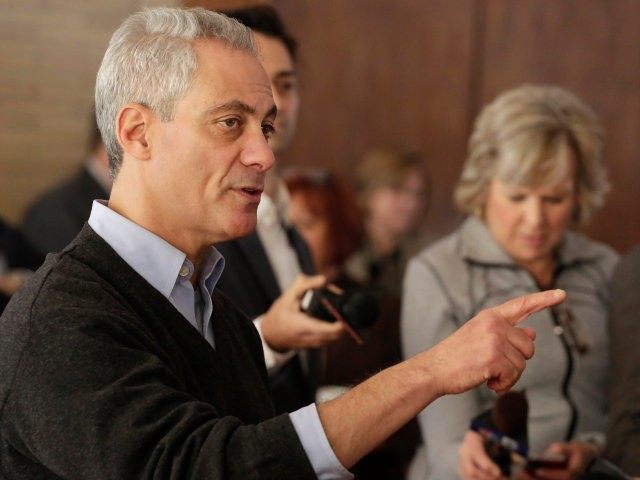As Chicago’s mayoral race heads to a rundown, incumbent Rahm Emanuel’s opponents are feeling confident.
“The mayor is going to lose,” Jay Sharkey, interim head of the Chicago Teachers Union tells Chicago Magazine. “Rahm can’t run away from the fact that he closed 50 schools, that he opposes an elected school board, that his donors list is full of rich people, many who live out of state or in the suburbs.”
“Chuy has the momentum,” Sharkey said, referring to Cook County Commissioner Jesus “Chuy” Garcia. Garcia stunned national Democrat insiders by forcing incumbent Mayor Rahm Emanuel into a run-off for mayor on Tuesday. It’ll be a first in Chicago’s history.
Emanuel was widely expected to clear the 50 percent vote threshold he needed to avoid a run-off in the nonpartisan election. Instead, a slate of four relatively unknown challengers held him to just 45 percent of the vote. Emanuel had the support of the entire political and business establishment in Chicago, the endorsements of both major newspapers and an overwhelming financial advantage.
Emanuel, a former White House Chief of Staff, even enlisted President Obama for a late campaign swing. Obama was also featured prominently in Emanuel’s campaign advertisements. Emanuel’s weak showing on Tuesday was in some measure a reflection on Obama’s dwindling political fortunes with his own base.
Rahm’s quasi-defeat was partially a repudiation of his own personal brand of politics. It was also, however, evidence of a profound shift within the Democrat electorate. An energetic and motivated progressive wing challenged the Democrat machine in Chicago and, for the most part, won.
The Chicago Teachers Union is merely the tip of that progressive spear.
Emanuel has had an adversarial relationship with the powerful local union. As mayor he sparked, and ultimately lost, a fight with the union over school reform. Karen Lewis, the combative former head of the union considered challenging Emanuel for mayor, but ultimately declined to run because of her diagnosis with brain cancer.
“Chuy” Garcia, an advisor to the early Lewis campaign, stepped up to challenge Emanuel at the last minute. In spite of his late entry into the contest, his low name identification with voters and meager campaign funds, he won a third of Tuesday’s vote.
The Teachers Union and progressive activists fueled Garcia’s late campaign surge. “We brought a lot of very committed people to this contest, especially in parts of the south and west sides,” Sharkey said. “We had 100-percent-committed volunteers working outdoors in brutally cold weather. We had phone banks going around the clock.”
The Teachers Union didn’t simply target Emanuel, but also campaigned for five of its members to win seats on the City Council. Two won seats outright, while the other three have forced run-offs against establishment candidates.
In the 33rd Ward, the Union candidate forced Deb Mell, daughter of long-time Ward Boss Dick Mell, into a run-off. To longtime observers of Chicago politics, that result is as shocking as Emanuel’s. That ward is a political fief for Mell and the run-off is a sign that the vaunted Democrat machine in Chicago is rusted-through. Emanuel received less than 40 percent of the vote in the 33rd.
The heart and soul of the Democrat machine run through the 11th and 13th Wards. Emanuel fell short of the 50 percent threshold in the 11th, long controlled by the Daley family. In the 13th, long controlled by Democrat party boss, House Speaker Mike Madigan, Emanuel just barely won more than half.
Emanuel did best in the largely white, affluent areas of the city. In many respects, these voters represent the leadership of the national Democrat party. The party’s foot-soldiers, however, are made up of public sector unions, low-income and minority voters. In Chicago, on Tuesday, these foot-soldiers revolted.
The Chicago election likely foreshadows a coming split in the national Democrat party. Hillary Clinton is again the presumptive front runner for the Democrat nomination and has the backing of the entire party establishment. This is, of course, the same situation she occupied in 2007.
Through his own personal appeal, then Sen. Barack Obama built a progressive infrastructure that derailed Clinton’s campaign. That infrastructure, fed by Obama’s class and race rhetoric for the past 6 years, still exists. Most troubling for the Democrat party, it has even moved beyond Obama, as Tuesday’s rejection of his endorsed candidate reveals.
Obama’s progressive army looks set to challenge the Democrat party as he leaves the political stage. If Sen. Elizabeth Warren or another progressive champion can marshal it, Hillary Clinton may once again see her Oval Office dreams evaporate.

COMMENTS
Please let us know if you're having issues with commenting.